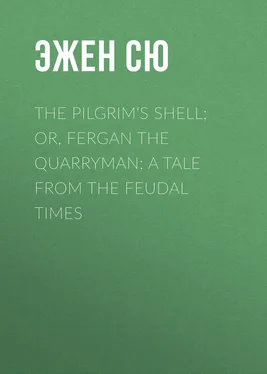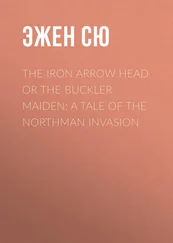Эжен Сю - The Pilgrim's Shell; Or, Fergan the Quarryman - A Tale from the Feudal Times
Здесь есть возможность читать онлайн «Эжен Сю - The Pilgrim's Shell; Or, Fergan the Quarryman - A Tale from the Feudal Times» — ознакомительный отрывок электронной книги совершенно бесплатно, а после прочтения отрывка купить полную версию. В некоторых случаях можно слушать аудио, скачать через торрент в формате fb2 и присутствует краткое содержание. Издательство: Иностранный паблик, Жанр: literature_19, foreign_antique, foreign_prose, на английском языке. Описание произведения, (предисловие) а так же отзывы посетителей доступны на портале библиотеки ЛибКат.
- Название:The Pilgrim's Shell; Or, Fergan the Quarryman: A Tale from the Feudal Times
- Автор:
- Издательство:Иностранный паблик
- Жанр:
- Год:неизвестен
- ISBN:нет данных
- Рейтинг книги:3 / 5. Голосов: 1
-
Избранное:Добавить в избранное
- Отзывы:
-
Ваша оценка:
- 60
- 1
- 2
- 3
- 4
- 5
The Pilgrim's Shell; Or, Fergan the Quarryman: A Tale from the Feudal Times: краткое содержание, описание и аннотация
Предлагаем к чтению аннотацию, описание, краткое содержание или предисловие (зависит от того, что написал сам автор книги «The Pilgrim's Shell; Or, Fergan the Quarryman: A Tale from the Feudal Times»). Если вы не нашли необходимую информацию о книге — напишите в комментариях, мы постараемся отыскать её.
The Pilgrim's Shell; Or, Fergan the Quarryman: A Tale from the Feudal Times — читать онлайн ознакомительный отрывок
Ниже представлен текст книги, разбитый по страницам. Система сохранения места последней прочитанной страницы, позволяет с удобством читать онлайн бесплатно книгу «The Pilgrim's Shell; Or, Fergan the Quarryman: A Tale from the Feudal Times», без необходимости каждый раз заново искать на чём Вы остановились. Поставьте закладку, и сможете в любой момент перейти на страницу, на которой закончили чтение.
Интервал:
Закладка:
Neroweg uttered a cry of rage, and, drawing his dagger, rushed upon Azenor. But her marble figure remained impassive, her white lips curled in disdainful smile. "Kill me, coward knight, assassin!"
After a moment of savage irresolution, Neroweg returned his dagger to the scabbard: "Oh, damned be the day I captured you on the road to Angers. It is you who brought down the curse that rests upon this castle. But will ye, nill ye, you shall yourself break the spell you have thrown upon me and my children, who, like their father, are becoming somber and silent."
"That's the business of the philter, which I am preparing."
The conversation was at this point interrupted by two raps on the door from without. Neroweg asked roughly: "Who's that?"
"Seigneur Count," a voice answered, "you are waited to open the session of the court in the stone hall!"
Neroweg made a gesture of impatience, and, donning the iron casque which he had laid on a settee, replied: "Once the homage of my vassals pleased my vanity. To-day everything annoys, everything is irksome to me. Oh, sad is my life!"
"To-morrow, thanks to my philter, nothing more will weigh upon you – nor upon yours," observed Azenor, and, placing in the Count's hands the two little wax images, she added: "Your two enemies – the Sire of Castel-Redon and the Bishop of Nantes – will soon fall into your hands, provided you yourself place these magic figures where I have told you, while you pronounce three times the names of Judas, of Astaroth and of Jesus."
"It is hard for me to pronounce the name of Jesus in connection with this sorcery," remarked Neroweg, raising his head and receiving almost fearfully the two little figures. "To-night the philter; if not, you die to-morrow!" Then, bethinking himself, "Where is the child?"
"In that alcove," answered Azenor.
Neroweg walked towards the turret, raised the curtain and saw little Colombaik, the son of Fergan the Quarryman, lying on the floor. The innocent creature was sound asleep at the foot of a stand loaded with vases of bizarre form. The walls of the turret, paneled with marble slabs, rose bare to the ceiling, the floor of whose upper story was on a level with the platform of the donjon. Neroweg, after contemplating the child for an instant, stepped out of the donjon, double-locking the door after him, and taking care to withdraw the key and place it in his jerkin.
CHAPTER VI.
FEUDAL JUSTICE
Eberhard the Tricky, one of the equerries of the seigneur of Plouernel, awaited his master outside of the retreat of Azenor, in company with Thiebold, justiciary provost of the seigniory. The latter addressed Neroweg, who was slowly descending the stone staircase.
"The chatelain of the fort of Ferte-Mehan signed the relinquishment of his fief of Haut-Menil at the third wedge struck into his knee by the gaoler. The Sire of Breuil-le-Haudoin died of the results of the torture. The Abbot Guilbert offers three hundred silver sous for his ransom. But he has not yet been put to the torture, and such offers mean nothing. We shall proceed in order."
"And then? What other cases are there?"
"That's all. There is to-day nothing else on hand."
While carrying on this conversation the Seigneur of Plouernel, his provost and his equerry, descended to the basement of the donjon-keep, at the corner where the staircase landed. A narrow window, guarded with enormous iron bars, alone lighted this vast hall, bare, somber and vaulted. In the inside yard several men-at-arms held themselves ready to mount their horses. Near the center of the hall, which served as a court of pleas, stood, according to custom, a large stone table, behind which ranged themselves the officers of the house of the Count – the master of the horse, the master of the chamber, the master of the dogs, of the falcons, of the table, and several other dignitaries. These people, instead of being paid by the seigneurs, bought from them these hereditary offices in their families, an inheritance that at times became odd by the contrast it presented between the function and the incumbent. It happened that a post of runner, sold in fief to an agile and vigorous man, often descended as the inheritance of a son, as unfit for the post as a broken-winded ox. The seigneurs, with an eye to revenue, multiplied these offices all they could, and the purchasers yielded, not so much to the pride of belonging to the seigniorial households as to the desire of sheltering themselves from the master's lawlessness, and of sharing the fruits of his brigandage. In those dark days, the choice was between oppressing or being oppressed; submitting to the horrors of serfdom, or becoming the instruments of the feudal tyrants; joining them in doing violence, robbing and torturing one's fellows, or resigning oneself to undergo all these sufferings himself. Such were the sad results of the Frankish conquest. The seigneurs imposed servitude, the friars preached resignation, and the people of Gaul became cowardly, selfish and cruel. They rent themselves with their own hands by turning accomplices to their gaoler.
Besides the head domestics of Neroweg, present at these law courts, – which took the place of the Germanic "malhs" of the reign of Clovis – there was also the provost, the bailiff and the scribe of the seigniory. The latter, seated on a stool, his parchment rolls on his knees, his desk beside him, his pen between his teeth, awaited the opening of the session. The first domestics of the Count, respectful and timid, remained standing in a semi-circle behind their master. Since four of five centuries back, the class of the leudes, who, in the early days of the Frankish conquest, lived in common with and as equals of their chiefs, had ceased to exist. In the measure that the conquest became more firmly fixed, the titulary and beneficiary seigneurs of the soil of Gaul, shocked at the idea of equality contracted by their old companions in arms, evicted them little by little from the domains where chiefs and leudes had lived in common. The descendants of these obscure Frankish warriors, sacrificed to the pride and cupidity of the beneficiaries, soon fell into misery, and from misery into a servitude equal to that of the Gauls. Since then, Franks and Gauls – the former disinherited by ingratitude, the latter by conquest, and now joined in misery and servitude – felt a common hatred towards the church and the seigneurs. There were then but two classes – the common people , serfs, peasants and bourgeois or townsmen; and nobles , knights and seigneurs. The latter, isolating themselves ever more, lived like absolute sovereigns in their strongholds, having no equals, but only menials, the accomplices of their acts of brigandage; or serfs, stupefied by terror or besotted by the friars.
Gonthram and Guy, the two sons of Neroweg, the younger at the left, the elder at the right of their father, attended the court. The latter had just reached the age of knighthood, a glorious event, so dearly paid for by the serfs of the seigniory. Gonthram resembled his father greatly. A look at the whelp told what he would be when age would have made of him a wolf. Guy, the younger, seventeen years of age, recalled the sardonic and vindictive features of his mother, Hermangarde. These two youths, brought up in the midst of this life of strife, of rapine and of debauchery, left to the violence of their passions, disposing as masters over an abject population, had none of the charms that are the attribute of adolescence. Away in a corner of the hall stood several bourgeois of the little town of Plouernel, who had come to complain of the exactions of the Count's men; or to excuse themselves for failure to pay the imposts in money and goods that it had pleased their seigneur to lay upon them; or to plead that the dues credited to the seigneur had long been met or exceeded; or yet to announce that they had removed from their roofs the weather-vanes, placed there in ignorance of the seigniorial rights, and taken down the pigeon houses they had started to raise in violation of the prescriptions of the feudal law.
Читать дальшеИнтервал:
Закладка:
Похожие книги на «The Pilgrim's Shell; Or, Fergan the Quarryman: A Tale from the Feudal Times»
Представляем Вашему вниманию похожие книги на «The Pilgrim's Shell; Or, Fergan the Quarryman: A Tale from the Feudal Times» списком для выбора. Мы отобрали схожую по названию и смыслу литературу в надежде предоставить читателям больше вариантов отыскать новые, интересные, ещё непрочитанные произведения.
Обсуждение, отзывы о книге «The Pilgrim's Shell; Or, Fergan the Quarryman: A Tale from the Feudal Times» и просто собственные мнения читателей. Оставьте ваши комментарии, напишите, что Вы думаете о произведении, его смысле или главных героях. Укажите что конкретно понравилось, а что нет, и почему Вы так считаете.












